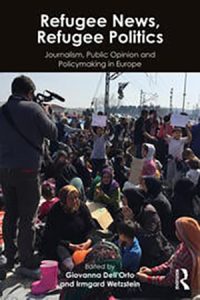Refugee News, Refugee Politics: Journalism, Public Opinion and Policymaking in Europe

Editor(s): Giovanna Dell’Orto & Irmgard Wetzstein
Publisher: Routledge
Year of Publication: 2019
Print Length: 252 pages
Genre: Non-Fiction / Migration & Refugee Studies, Political Science, Social Science
Area: Idomeni, Greece, Austria, Germany, Europe
People: Greek, Austrian, German, Afghan
Topic: Apathy, Asylum & Asylum Seekers, Refugees & Forced Migration, Asylum & Refugee System, Media & Narratives, Journalism, Politics & Power, Public Opinion, Public Disillusion, Propaganda, Policy & Practice, Statistics, Writing, Hate Speech, Xenophobia, Borders, Crimes, Security, Democracy, Liberal Democracy, Human Rights, Education, Inclusive Education, Integration, National Identity & Nationality, Identity, Gender, Hostility, Hospitality, Social Cohesion, Trust, Emotions & Feelings, Empathy, Ethics & Morality, The European Union (EU)
The unprecedented arrival of more than a million refugees, asylum seekers, and migrants – plus the political, public, and policy reactions to it – is redefining Europe. The repercussions will last for generations on such central issues as security, national identity, human rights, and the very structure of liberal democracies. What is the role of the news media in telling the story of the 2010s refugee crisis at a time of deepening crisis for journalism, as “fake news” ran rampant amid an increasingly distrustful public?
This volume offers students, scholars, and the general reader original research and candid frontline insights to understand the intersecting influences of journalistic practices, news discourses, public opinion, and policymaking on one of the most polarizing issues of our time. Focusing on current events in Greece, Austria, and Germany – critical entry and destination countries – it introduces a groundbreaking dialogue between elite national and international media, academic institutions, and civil society organizations, revealing the complex impacts of the news media on the thorny sociopolitical dilemmas raised by the integration of hundreds of thousands of asylum seekers in EU countries.
Table of Contents
List of Figures
List of Tables
Notes on Contributors
Acknowledgments
Introduction: Situating The “Refugee Crisis” and Its Sociopolitical Effects through 21st-Century European Journalism — Giovanna Dell’Orto (University of Minnesota) and Irmgard Wetzstein (University of Vienna)
PART I. POLICY, POLITICS, AND MEDIA DISCOURSES FROM FORTRESS EUROPE TO MUTTI MERKEL AND IDOMENI
1. Welcoming Citizens, Divided Government, Simplifying Media: Germany’s Refugee Crisis, 2015–2017 — Dietrich Thränhardt (University of Münster)
Notes from the Field: One Sentence, Many Misunderstandings: A German Journalist Reflects on Germany’s “We Can Do It” Stance — Peter Riesbeck (Tagesspiegel Contributing Writer)
2. The Expectations-Politics-Policy Conundrum: Assessing the Impact of the Migration and Refugee Crisis on the European Union — Vicki L. Birchfield (Georgia Institute of Technology) and Geoffrey Harris (Belgium College of Europe)
3. “Fortress Europe”: Representation and Argumentation in Austrian Media and EU Press Releases on Border Policies — Sabine Lehner and Markus Rheindorf (University of Vienna)
4. The Gender Dimension of the Refugee Debate: Progressiveness and Backwardness Discourses in Austrian Press Coverage — Irmgard Wetzstein
5. Empathy Toward Refugees, Apathy Toward Journalism: Hundreds of Thousands of Refugees in Greece, Thousands of Stories, Just a Few Hundred Clicks — Andreas M. Panagopoulos (Aristotle University of Thessaloniki)
Notes from the Field: Real Empathy, Fake News? One Reporter’s Experiences on the Frontlines in Northern Greece — Costas Kantouris (Macedonia and The Associated Press)
PART II. CIVIL SOCIETY RESPONSES AS ANOTHER LENS INTO PUBLIC OPINION IN GREECE, AUSTRIA, AND GERMANY
6. Moving On and In: Integration through Shared and Independent Living Spaces in Greece — Sophia Ioannou with Valia Savvidou (SolidarityNow)
7. Tackling The “Refugee Crisis” and Meeting the Educational Needs of Newly Arrived Refugees: Programs for Refugee Teachers and Students in Germany and Austria — Kerstin Lueck (University of Postdam, Germany) and Leonhard Dokalik-Wetzstein (Primary School Teacher in Vienna, Austria)
8. Online Fake News, Hateful Posts Against Refugees, and a Surge in Xenophobia and Hate Crimes in Austria — Claudia Schäfer with Andreas Schadauer (ZARA—Civil Courage and Anti-Racism Work)
PART III. JOURNALISM AT THE BORDER: REPORTING ON THE CRISIS IN GREECE
9. Trying to Find the Right Words — Ioannis Papadopoulos (Kathimerini)
10. Down and Out and Wet & Bedraggled: Navigating the Emotional and Ethical Maelstrom of Reporting from the Crisis Flashpoint of Idomeni — Phoebe Fronista (Freelance Television Producer) and Sofia Papadopoulou (Head of Northern Greece Directorate, Athens News Agency-Macedonian Press Agency (ANA-MPA))
11. Overcoming the Empathy Gap: Covering Europe’s Migrant Crisis for an American Audience — Jeanne Carstensen (Independent Journalist)
12. Reporting Back to the Migrant Audience: Afghans’ Exodus and Perilous Journey to Europe — Mustafa Mohammad Sarwar (Radio Free Europe /Radio Liberty)
13. Avoiding the Traps of the Numbers Game and Caricatures: The Responsibility of Keeping the Factual Record for the World — Elena Becatoros and David Rising (The Associated Press, Greece and Germany)
PART IV. JOURNALISM AND INTEGRATION: REPORTING ON THE CRISIS IN AUSTRIA AND GERMANY
14. From Empathy to Hostility in 127 Days: The Journey of Austrian Press and TV Coverage — Edith Meinhart & Martin Staudinger (profil) and Peter Unger (Österreichischer Rundfunk)
15. Cologne’s New Year’s Eve Sexual Assaults: The Turning Point in German Media Coverage — Jan Bielicki (Süddeutsche Zeitung)
Notes from the Field: Fake News and a Profession in Crisis: A Foreign Correspondent Reflects on “Willkommenskultur” — Carmen Valero (El Mundo, Berlin)
16. Torn Between Transparency and Stereotypes? How to Report About Refugees and Crime — Eva Thöne (Spiegel Online)
17. Widening the Focus: Why Writing about Migration is More than Writing about Migrants — Caterina Lobenstein (Die Zeit)
18. After the Arrival: Telling Stories of Integration in Germany for a Global Audience — Melissa Eddy (The New York Times)
Conclusion: Interplays of Journalistic Practices, News, Public Opinion, and Policies in Europe’s Refugee Crisis — Giovanna Dell’Orto
Index

Giovanna Dell’Orto is Associate Professor at the University of Minnesota’s Hubbard School of Journalism and Mass Communication, and affiliated faculty at the Center for German and European Studies and Department of Political Science. A former journalist with The Associated Press (AP), she is the author of four books on journalism and international affairs, most recently AP Foreign Correspondents in Action and American Journalism and International Relations (Cambridge University Press, 2015 and 2013), and coeditor of Reporting at the Southern Borders (Routledge, 2013).
Source: https://www.routledge.com/Refugee-News-Refugee-Politics-Journalism-Public-Opinion-and-Policymaking/DellOrto-Wetzstein/p/book/9781138485389
More from Giovanna Dell’Orto in this library, click here.

Irmgard Wetzstein is Senior Lecturer at the Department of Communication, University of Vienna, former Fulbright Visiting Professor at the University of Minnesota, and trained mediator. She received her PhD in media communications in 2010 and has been working in social research and teaching since 2006, focusing on journalism and conflict communication, social media, strategic and visual communication. Before that, she worked at the Austrian news magazine profil and the Austrian Insurance Association’s PR division.
Source: https://www.routledge.com/Refugee-News-Refugee-Politics-Journalism-Public-Opinion-and-Policymaking/DellOrto-Wetzstein/p/book/9781138485389
More from Irmgard Wetzstein in this library, click here.
